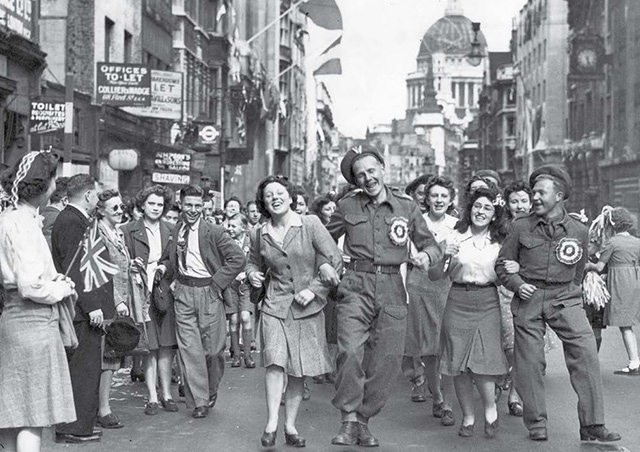VE Day – 80 years

80th anniversary of the end of the Second World War in Europe
It is 80 years since the fighting in Europe finished in May 1945. For a short period, a sense of peace spread across most of the continent. For the previous month the fighting had swerved between periods of intensity, with street-to-street battles as the last remnants of the Third Reich attempted to resist the inevitable, and places of calm where liberation had finally occurred, or surrender had been accepted. For the years before the closing stages the war was always active and brutal somewhere in the world, with bombardments, oppression, threats, suffering and fighting a constant situation.
The war introduced new military tactics, utilised the new technology of the early twentieth century such as aircraft and armoured vehicles, and brought Total War to civilian communities and populations alongside those in military uniform.
No countries across Europe escaped the conflict, not even those who managed to claim neutrality as they all became either a place of refuge for those escaping the horror or the supplier of goods for those carrying out the fighting.
Civilian populations across the globe lived in fear of attack or ongoing persecution. For many, as in the UK, everyone was expected to support the war effort on the Home Front while also hoping that loved ones were neither killed nor captured. Elsewhere civilians feared occupation, oppression and death; many also feared starvation as a result of deliberate policies.
Simultaneous to the Second World War, entwined with the war efforts of the Nazis was the Holocaust and their murderous ideological campaign inflicted on their ideological opponents and all those they viewed as racially inferior. The organised murder of six million Jews and other victims of Nazi ideals, including Gypsy, Roma, Sinti, Slavs, Poles, gay men and women, Jehovah’s Witnesses and political opponents, alongside the millions of other European citizens who were killed in round-ups, Concentration and labour camps and POW camps for Soviet military, and euthanasia centres, constitutes one of the largest historical policies of killing that any state has intentionally enacted against others.
The VE Day celebrations in Europe, the Americas and in many areas of the British Empire and Commonwealth marked an end to the suffering across large parts of the world; however, they were tinged with a sense of sadness for the destruction that had occurred and for those still fighting as the war continued in the Far East. It would take a further three months for the war to end with the surrender of Japan following the Allies’ dropping of the atomic bomb, an act of war like no other.
The Second World War saw a global death toll of between 70- 85 million people, with fighting across the world’s continents. Following closely on the heels of the First World War the second conflict underlined many people’s belief that trying to stop wars from occurring had to be a fundamental part of any peace. It was not surprising that the United Nations and other international conventions were some of the key political outcomes after 1945.
Sadly, the Second World War did not bring an end to some countries’ and political leaders’ blood lust, with wars continuing in the decades following 1945. However, the end of the World War 80 years ago and the measures that were carried out after it at least attempted to bring a lasting peace. Perhaps by remembering the horrors that occurred during that conflict people can be made to understand why efforts to curtail extremism and those that stoke war is so necessary.
For VE Day 80, enjoy the bunting, the nostalgia and the Pimms, but also thoughtfully reflect on the past – because while it does not provide a blueprint for the future it can act as a reminder of what happens when society stops valuing international engagement, conversation and peace.

